— Snaut, the cyberneticist, from Tarkovsky's Solaris, as quoted in my paper "Feeling Very Estranged: Science Fiction and Society in the Aftermath of the Twentieth Century."
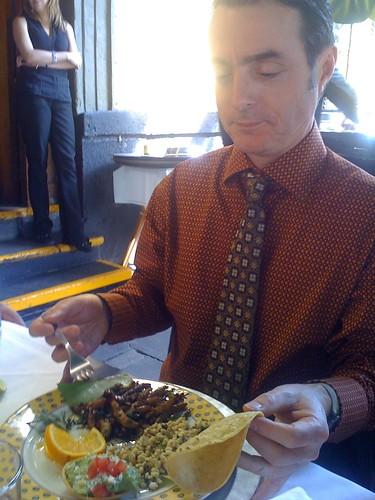
[Pic: Mark Dery about to dive into a hearty meal of escamoles (eggs harvested from the abdomens of very large ants) and some sort of fried grub.]
I am back from a week in D.F. con los Mexicanos Fantasticos. The three-day colloquium on Parallel Worlds as the literary track of the Festival de Mexico, featuring Mark Dery, Christopher Priest, M. John Harrison, Bruce Sterling, Linda Nagata and me, moderated by authors Mauricio Montiel (who put together the amazing program with the encouragement of Festival director Jose Wolffer), Bernardo Fernandez (BEF), Alberto Chimal, and Pepe Rojo ended Thursday, but I am just now collecting myself from the experience.
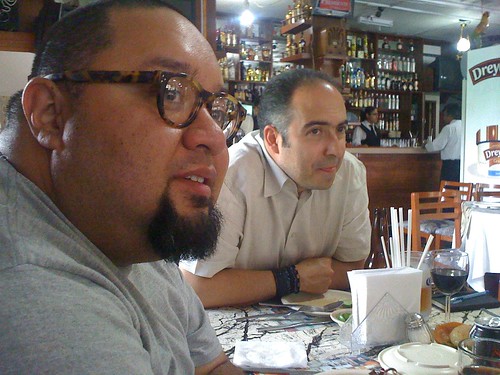
[Pic: Author and comics auteur Bernardo Fernandez (BEF) and author, organizer and Dharma Initiative member Mauricio Montiel Figueiras.]
The program featured two tracks each day: a noon round table discussion featuring two of the gringo autores answering questions from the moderator and the audience, with an evening presentation of lectures/essays by two of the speakers. Thematically, much of the discussion seemed to focus on science fiction as the literature best equipped to understand contemporary identity in a technologically mediated world.
Some of the highlights (in addition to those previously blogged here, including remarks by Mark Dery and Christopher Priest):
M. John Harrison on the idea of personality. The idea that we are all cpmpiling our personalities moment to moment. The twenty-first century will reveal all that, and cure it.
"I was raised with fixed cultures as being wholly determinative of the individual's identity... The collapse of culture may already have happened, and we may be on the other side of it, and it's probably a good thing."
We live in era in which the self exists in mediated feedback loops, in which media inputs impact personality. How you interrupt those loops remains to be seen. The Adbusters approach does not seem to be the answer.
The writer's task is to "write about individuals who are constantly being mediated and re-mediated. Not alienated, but pureed."
"If you want to break an orthodoxy, the first thing to do is to break the medium itself."
"While I think of myself as a subtle propagandist, I am propagandist for my own ideas."
"I write to find out why I'm writing what I'm writing."
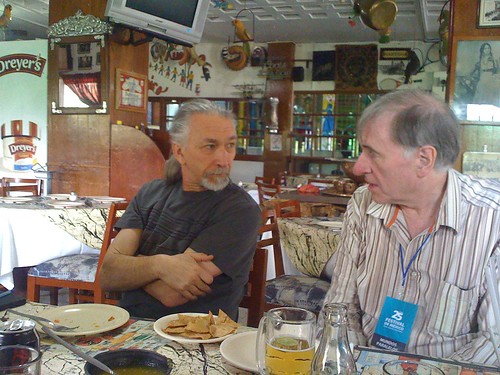
[Pic: M. John Harrison and Christopher Priest enjoying a long lunch properly lubricated for the discussion of temas fantasticas.]
Linda Nagata: "Could it be that as a sign of intimacy, we show more identities to each other?"
Bruce Sterling: The fluidity of the idea of national identity.
The idea of "developing countries" is a bogus anachronism. Places like Mexico City are better thought of as "areas of global urbanization." Mexico CIty is much closer to the reality of Shanghai or Lagos than rural Chiapas or Oaxaca. Mexico CIty as the "global capital of Latino globalization."
The ascendant role of the *city*, which establish national economic archetypes and don't care about borders, in a world where the nation state is slipping away, as the national governments lose control of their economies and borders.
"People talk about emerging economies. What about *submerging* economies -- places like Detroit...parts of D.C. where the AIDS rates are higher than Uganda."
"In the future, the poor will not be able to avoid becoming posthuman, because they just can't afford it."
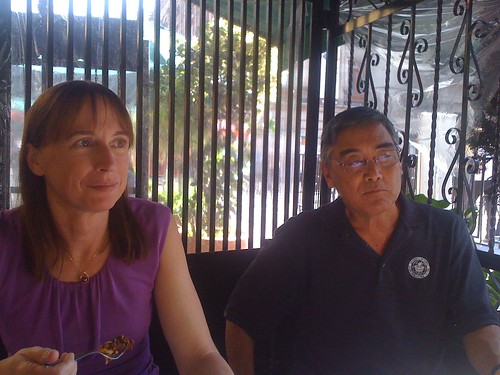
[Pic: Los Nagatas, comiendo.]
"Nationalism is mostly useful when you are being invaded by another country...If no one invades you, you can disintegrate, expecting invasion, like Russia, but instead getting total collapse."
We started in the 20th century with the self characterized by a condition of modern anomie and alienation. We then moved into the postmodern condition, characterized by technology and subjectivity fragmentation. We are now moving into something else, the precise characteristics of which remain to be seen...
Envisioning a viable future that is not disastrous, Bruce considers the possibility that (i) we might get to where our technology is sustainable, (ii) we get rid of material poverty — food and shelter and rudimentary health care, and (iii) we secure extended lifespans in which it is common to be 100-110 years old. The result? "A serene Ft. Lauderdale society run by old people who are healthy and enjoy themselves...The 20-year-olds may rebel, but mostly they wait their turn."
The early indicators of posthumanism:
- athletes
- celebrities
- supermodels
- political/cult heroes
Terri Schiavo was the first celebrity posthuman, and there was recently an Italian Terri Schiavo. Keep your eyes out for the next one.
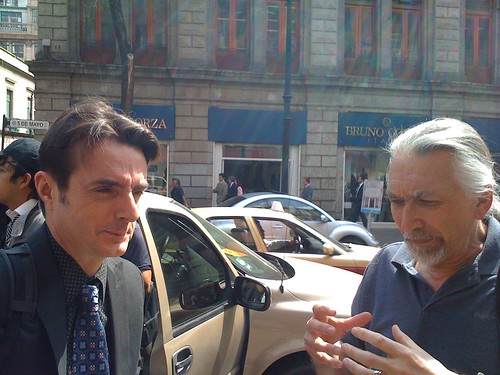
[Pic: Mark Dery and M. John Harrison debating posthuman ethics outside El Opera.]
Mark Dery:
On the space age: "Was it all just a moonage daydream?"
A mythology of the next five minutes.
"In the age of YouTube, we've learned to stop worrying and love the Panopticon."
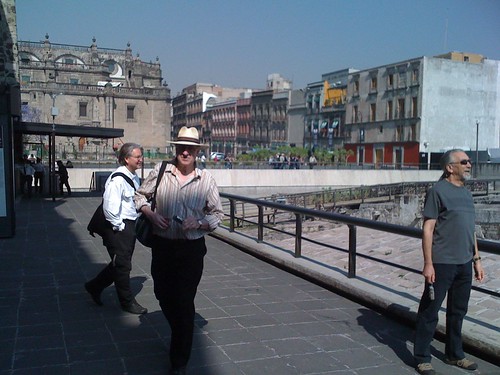
[Pic: Bruce Sterling, Christopher Priest, and M. John Harrison relighting the pilot light on their sense of wonder at the Templo Mayor.]
Christopher Priest:
"The general novel (and also the fantasy novel) can of course contain actions or decisions, with consequences for which the characters become responsible...the point I am making is that only in the modern speculative novel is responsibility the core, the argument, the message.
"When ideas are suppressed, the tyrants move in to manipulate ordinary people. When expression is made less free, then ideas start to suffer. I hold as axiomatic the belief the fiction should express ideas, should defy tyrants and governments, that it should speak directly to the reader, and provide entertainment and provocation in equal measure. This is the cause for which I stand."
Mexico City is a truly magnificent 21st century city, a cultural, ethnic, and architectural/archeological palimpsest where the pre-Columbian past and the colonial ghosts and the imminent future all coexist in a space where one sometimes expects to turn the corner and find Perdido Street Station. Our hosts were all smarter and more prolific than us (and infinitely more hospitable), revealing a Mexican sf and fantastic fiction scene that merits more attention from its northern neighbors (more on that later, but the early plans for a cross-border fantastic fiction fest in Juarez or Tijuana are abrewing). Most impressive were the audience members, who asked some of the most provocative questions on these topics any of us had ever heard.
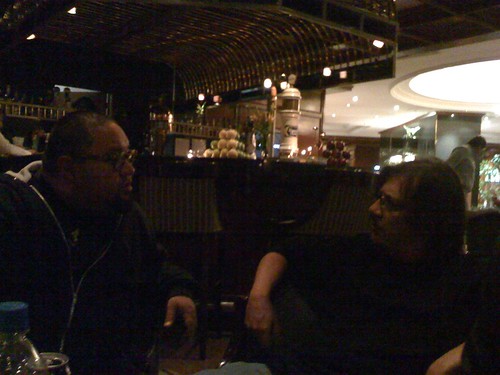
[Pic: Mad genius collaborators Bernardo Fernandez (BEF) and Pepe Rojo, planning their epic film memoir of their trip through Morocco retracing the steps of William S. Burroughs.]
3 comments:
Hey, it was great having you guys around.
Whew, that was awesome. Thank you for sharing!
>"Most impressive were the audience members, who asked some of the most provocative questions on these topics any of us had ever heard."
Oh you tease! Transcribe the questions! =)
Post a Comment